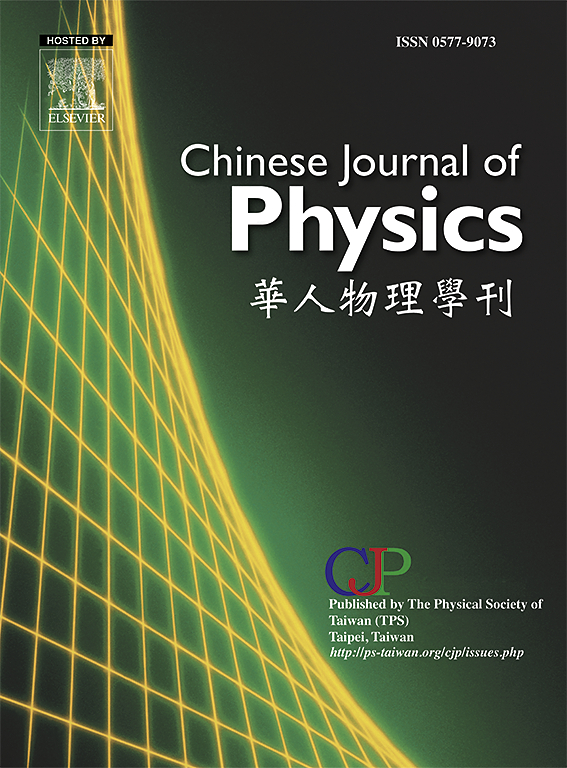Effects of external magnetic field and DM x-interaction on Fisher and Wigner–Yanase information correlations of thermal Heisenberg XYZ states
IF 4.6
2区 物理与天体物理
Q1 PHYSICS, MULTIDISCIPLINARY
引用次数: 0
Abstract
This study investigates the influence of temperature, the Dzyaloshinsky–Moriya (spin–orbit) interaction and an external inhomogeneous magnetic field in the -direction on the thermal quantum information resources in general spin–spin Heisenberg XYZ states, focusing on local quantum Fisher information (LQFI), local quantum uncertainty (LQU) and concurrence correlations. The thermal behavior of quantum information quantifiers is analyzed under the influence of the spin–spin interaction, the spin–orbit interaction in the -direction, and the uniformity and inhomogeneity of an applied external magnetic field in the -direction. The study shows that quantum phenomena such as the sudden transition of entanglement and the appearance of stable correlations can be controlled by spin–spin and spin–orbit interactions as well as temperature. Furthermore, LQFI and concurrence correlations show greater robustness to temperature effects compared to LQU. After investigating the dependence of thermal correlations on the spin–spin interaction, the spin–orbit interaction, and the uniformity and inhomogeneity of the applied external magnetic field, we find that the enhancement of the -spin–orbit interaction for quantum information quantifiers and the stability of the maximal correlation intervals depend on the applied external magnetic field. An increase in the uniformity or inhomogeneity of the applied magnetic field leads to a degradation of the quantum information resources, depending on the spin–orbit interaction. Finally, our results confirm that the dependence of the quantum information resources on the spin–spin couplings can be controlled by the spin–spin and spin–orbit interactions as well as by the applied external magnetic field.

外磁场和DM - x相互作用对热海森堡XYZ态Fisher和Wigner-Yanase信息相关的影响
本文研究了温度、Dzyaloshinsky-Moriya(自旋-轨道)相互作用和x方向外不均匀磁场对一般自旋-自旋海森堡XYZ态热量子信息资源的影响,重点研究了局域量子Fisher信息(LQFI)、局域量子不确定性(LQU)和并发相关性。分析了自旋-自旋相互作用、x方向自旋-轨道相互作用以及外加磁场在x方向均匀性和非均匀性的影响下量子信息量子器的热行为。研究表明,自旋-自旋和自旋-轨道相互作用以及温度可以控制纠缠的突然转变和稳定相关的出现等量子现象。此外,与LQU相比,LQFI和并发相关性对温度效应的鲁棒性更强。在研究了自旋-自旋相互作用、自旋-轨道相互作用以及外加磁场的均匀性和非均匀性对热相关的依赖性后,我们发现量子信息量子器的x-自旋-轨道相互作用的增强和最大相关区间的稳定性取决于外加磁场。外加磁场的均匀性或非均匀性的增加会导致量子信息资源的退化,这取决于自旋轨道相互作用。最后,我们的研究结果证实了量子信息资源对自旋-自旋耦合的依赖可以通过自旋-自旋和自旋-轨道相互作用以及外加磁场来控制。
本文章由计算机程序翻译,如有差异,请以英文原文为准。
求助全文
约1分钟内获得全文
求助全文
来源期刊

Chinese Journal of Physics
物理-物理:综合
CiteScore
8.50
自引率
10.00%
发文量
361
审稿时长
44 days
期刊介绍:
The Chinese Journal of Physics publishes important advances in various branches in physics, including statistical and biophysical physics, condensed matter physics, atomic/molecular physics, optics, particle physics and nuclear physics.
The editors welcome manuscripts on:
-General Physics: Statistical and Quantum Mechanics, etc.-
Gravitation and Astrophysics-
Elementary Particles and Fields-
Nuclear Physics-
Atomic, Molecular, and Optical Physics-
Quantum Information and Quantum Computation-
Fluid Dynamics, Nonlinear Dynamics, Chaos, and Complex Networks-
Plasma and Beam Physics-
Condensed Matter: Structure, etc.-
Condensed Matter: Electronic Properties, etc.-
Polymer, Soft Matter, Biological, and Interdisciplinary Physics.
CJP publishes regular research papers, feature articles and review papers.
 求助内容:
求助内容: 应助结果提醒方式:
应助结果提醒方式:


